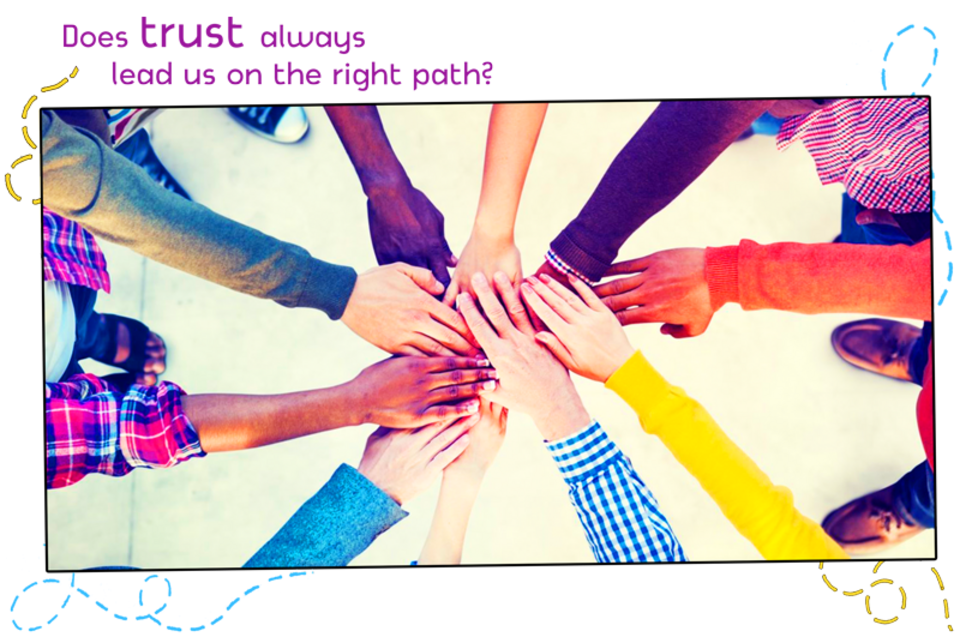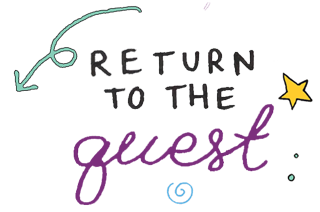
Testing trust
| Objective: To make your views on the concept of trust shine by putting it to the test in a great performance! |
Duration: 30 to 60 minutes
Material:
- Space to move
- A family that’s up for anything!
Instructions:
- Prepare the performance. Your mission is to lead a great artistic performance inviting your audience to experience the concept of trust by facing a series of challenges! An artistic performance is a lively and spontaneous work, generated in relation to the environment in which it takes place. Therefore, you will first have to choose a place and time that is conducive to such an experience. In your opinion, what would be the best atmosphere to experience trust with your audience? Will you need a bright and welcoming place... or a dark and scary one? You can change the atmosphere of a room by adjusting the lighting and moving some of the furniture, but make sure you have enough space to move your bodies... as well as your thoughts!
- Invite your family. When both the mood and the time are right, invite your family to participate in the great trust performance!
- Experience the performance. Introduce the following challenges to your family, taking the time you need to complete each one before moving onto the next one.
- Blindness: For this first challenge, make teams of two. One person has to close their eyes while the other becomes their guide. The guide must lead the blind person around the house, holding them by the arm to show them the way and the obstacles to avoid. After a few minutes, swap roles and/or change teams.
- Contortion: For this second challenge, make teams of two. One member of the team has to place their hand a few centimetres from their partner's face, whose face must remain the same distance from the hand the entire time. The first person will move their hand up and down, from right to left, or diagonally at a slow but continuous pace. The second person will have to make all kinds of contortions to keep the same distance between their face and the moving hand! Again, after a few minutes, swap roles and/or change teams.
- Fall: For this third challenge, make teams of two once again. One person has to turn their back to the other, who has to stand behind them. The first person will have to fall backwards and be caught by the second person—without either of them moving their feet! At the beginning of the challenge, partners can stand close to each other, then they can try moving farther away from one another (though ensuring they are still able to catch the person falling!). Once again, after a few minutes, swap roles and/or change teams.
- Reflect on the performance. Based on the experiences you have just had together, decide the extent to which you agree or disagree with the statements below, offering reasons to justify and explain your positions.
Tip: To add an element of performance to your thinking, create a spectrum from "agree" to "disagree" in the room you are in. At one end of the room is "agree" and at the other end is "disagree". Start by standing in the centre of the room and appoint someone to read the statements one by one. If you agree with a statement, move toward "agree." The stronger your agreement, the closer you will need to get to the wall! And if you disagree with the statement, move toward "disagree"... but remember that there are lots of nuanced positions in between! Also, if a person’s explanation of their position makes you change your mind, don’t hesitate to move to show this change of mind with your body!
The statements:
- One should never trust blindly.
- Trust always guides us on the right path.
- We have to accept being dependent in order to trust.
- Trust is uncomfortable.
- Trust is a leap of faith.
- We can learn to trust.
...
Bonus: To take your thinking further, here is one last performative challenge for you to try: Look each other in the eye, without speaking, for a few minutes. It seems so easy! But... is it really? How did you feel during these few minutes? Did you feel comfortable? Did you find it difficult not to look away? We don't look people in the eye as often as we think... in fact, studies have even shown that the closer we are to a person, the less eye contact we make with them! Yet, looking at each other creates an instant bond. This is probably why so many people burst into tears when they looked at artist Marina Abramovi during her performance "The Artist Is Present," during which each visitor was invited to make eye contact with the artist in silence for one minute. Hmm... does being looked at make us vulnerable? Is it necessary to trust to look at one another... or to let ourselves be seen? |

| Tricks for tots: Have your parents ever told you: "Trust me"? If so, was it to reassure you when you were afraid of something... or to get you to stop challenging a decision they made? And do your parents trust you? Maybe it depends on what we're talking about: They may trust you to brush your teeth on your own, but they may not trust you to drive a car! Ask your parents if they trust you and how much they do. Then think about these questions together: Can a parent lose their child's trust? Can a child lose their parents’ trust? Is trust necessarily mutual, that is, can we only trust someone who also trusts us? Why or why not? |
| Tips for teens: Has anyone ever "betrayed your trust"? This expression means that someone has done something serious enough to lose the trust you had in them. For some people, this happens when someone has acted in a way that fundamentally clashes with the values they hold dear, while for others, a relatively minor slight is enough to shatter their trust. Moreover, some people are willing to give others a second chance, while others consider any betrayal to be final. Maybe these differences depend on people’s past experiences... What do you think is serious enough to be considered a betrayal? Can you still be friends with someone who has betrayed your trust? Is it possible to regain someone's trust after losing it? Why or why not? |
Share your creative reflections by sending them via email.
Include photos of your projects and notes of your thoughts, as well as your first name and your age!


